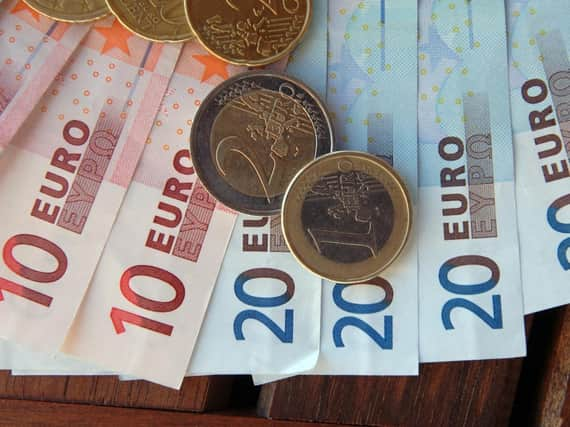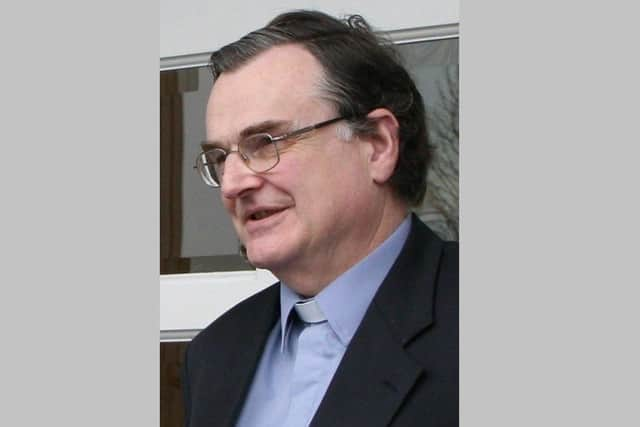Ian Ellis: Looking back on 20 years of a single currency — the euro


The euro became an electronic currency in 1999 with euro cash not appearing until 2002.
A new euro design is now planned by the European Central Bank, the president of which, Christine Lagarde, has said that after twenty years “it’s time to review the look of our banknotes”.
Advertisement
Hide AdAdvertisement
Hide AdI do remember what I considered especially elegant French franc banknotes. Hopefully they could be a model for redesigned euro notes.


To return to the proposition of the UK ditching the pound sterling to join the new euro, it was quite a dilemma at the time, with public opinion deeply split.
In order to try to form an opinion on the matter myself, I bought a small book, published in 2001, which I have carefully kept as a memento of the time.
It was written by award-winning journalist Anthony Browne who had been economics correspondent of the BBC and then The Observer newspaper.
Advertisement
Hide AdAdvertisement
Hide AdEntitled ‘The Euro: Should Britain Join: Yes or No?’, a glance inside showed that key questions were followed by the arguments for and against particular stances.
Surely here I would find the answer.
However, somewhat to my dismay, reading the book I got the impression that it was rather a case of six of one and half a dozen of the other.
The final question asked, “Do the benefits outweigh the costs?”.
Surely now I would get the answer.
Yet it was still Yes and No.
‘Yes’, any drawbacks would be “either small, or easily countered”, and: “If Britain stays out, we will lose out as European industry outstrips us in terms of competitiveness, and foreign investors decide to stay away.”
Advertisement
Hide AdAdvertisement
Hide AdBut ‘No’, the potential costs were “huge”, and there was a grim warning: “While the euro remains unproven, there is also the very real risk that it could collapse completely, at absolutely colossal economic cost.”
Individual eurozone nations’ inability to set interest rates for their country seemed to me to be a considerable downside. However, in a recent article in the Irish Independent, Christine Lagarde wrote that it has been thanks to the single currency and market that since the euro’s inception trade among the eurozone countries has seen tremendous growth.
She added: “People have been able to travel without worrying about the hassle and cost of exchanging money, and millions of students and professionals are studying and working abroad without having to deal with different currencies.”
Of course, we have been living on the island of Ireland with both the euro and pound sterling.
Advertisement
Hide AdAdvertisement
Hide AdPerhaps some businesses have found it a drawback but as an individual who visits the Republic frequently I can’t say it has been any great trouble to me.
However, I do remember, when visiting the German city of Bremen in 2009 in an official church capacity, being invited to a reception at the Bremen chamber of commerce.
I asked a couple of businessmen whether they thought the single currency was a good thing and they were emphatic that it was.
Albeit as someone who is not an economist by any means, I must say that I don’t get the impression that retaining the pound has been viewed as particularly detrimental to the UK, whereas I do acknowledge that many people feel Brexit has been.
Which brings me to the current Brexit protocol debate.
Advertisement
Hide AdAdvertisement
Hide AdWhile as a church figure it is not really for me to advocate a party political view, non-party political principles are another matter.
I believe it is clear that the protocol as it stands leaves a democratic deficit in that certain regulations will be made for us by an outside party, the EU.
While Stormont would periodically have the ability to ditch the whole arrangement, or to retain it, and while some consultation with the Northern Ireland Assembly might be arranged, none of this seems to me to make up for proper democratic input into regulation making. Moreover, a Stormont decision could be by simple majority as opposed to requiring cross-community consensus, a fundamental value in the Belfast Agreement.
On the other hand, it can be argued that putting up with this is a price worth paying for a peaceful future.
Advertisement
Hide AdAdvertisement
Hide AdHowever, because of strong feelings on the sovereignty issue, the protocol arrangements could in fact end up destroying the peace rather than protecting it and a collapse of the Stormont administration would surely be in no-one’s interest.
Violence is certainly not the way forward yet neither is being cavalier about the possibility that it could return.
The Belfast Agreement rests on a delicate balance. Disturbing that balance, as the protocol does, is hazardous.
It has been surprising that some politicians both at home and abroad have seemed not alert enough to recognise that protecting the Belfast Agreement requires protecting the interests and respecting the aspirations of all parts of the community.
Advertisement
Hide AdAdvertisement
Hide AdIt is clear that the negotiators are going to have to come up with some very creative answers very quickly indeed.
• Canon Ian Ellis is a former editor of The Church of Ireland Gazette
• Peter Robinson is recovering from an operation. He hopes to resume his column soon
——— ———
A message from the Editor:
Thank you for reading this story on our website. While I have your attention, I also have an important request to make of you.
Advertisement
Hide AdAdvertisement
Hide AdWith the coronavirus lockdowns having had a major impact on many of our advertisers — and consequently the revenue we receive — we are more reliant than ever on you taking out a digital subscription.
Subscribe to newsletter.co.uk and enjoy unlimited access to the best Northern Ireland and UK news and information online and on our app. With a digital subscription, you can read more than 5 articles, see fewer ads, enjoy faster load times, and get access to exclusive newsletters and content.
Visit
now to sign up.
Our journalism costs money and we rely on advertising, print and digital revenues to help to support them. By supporting us, we are able to support you in providing trusted, fact-checked content for this website.
Ben Lowry, Editor